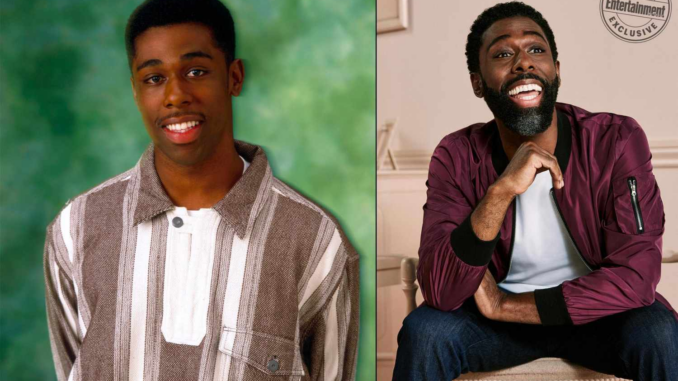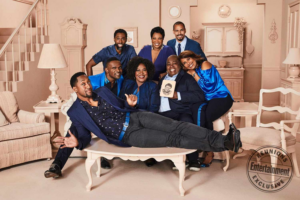
Jaleel White, the actor who became a household name through his portrayal of Steve Urkel on Family Matters, has always had a unique perspective on the show’s place in television history. In a recent interview, White addressed why he shot down the idea of a Family Matters reboot and why he believes the show never received the recognition it truly deserves.
In an era where Black sitcoms are being revisited for reboots, White’s rejection of a Family Matters revival speaks volumes about the broader conversation surrounding Black representation in media. According to White, “If it’s not a hood story, it’s not a Black story.” This controversial statement shines a light on the industry’s tendency to sideline certain narratives in favor of ones that fit a more stereotypical view of Black life in America. So why was Family Matters—a show about a loving, middle-class Black family—overlooked in the same way?
Let’s break down Jaleel White’s perspective on why Family Matters didn’t get the recognition it deserved, why he rejected the reboot, and what it all means for the future of Black storytelling in Hollywood.
Why Family Matters Is More Than Just a Sitcom
Family Matters isn’t just a classic 90s sitcom; it’s a cultural milestone. Airing from 1989 to 1998, it was one of the first sitcoms to feature a Black middle-class family that wasn’t defined by hardship or violence. The show’s portrayal of the Winslow family as successful, well-adjusted, and loving was groundbreaking in an era where Black families on TV were often depicted in a more stereotypical light.
But despite its impact, Family Matters didn’t receive the same level of praise or recognition as other Black sitcoms like The Fresh Prince of Bel-Air or Martin. The question is: why? According to Jaleel White, this could be because Family Matters didn’t fit the traditional mold of what a “Black story” was expected to look like in Hollywood. For White, Hollywood’s narrow view of Black life in America has played a major role in the lack of recognition for the show.
Jaleel White’s Frustration With Hollywood’s Limited View of Black Stories
In his interview, White expressed frustration with Hollywood’s tendency to champion “hood” stories over those that depict Black families in more suburban or aspirational contexts. “If it’s not a hood story, it’s not a Black story,” he said. This statement cuts to the heart of a major issue within the entertainment industry: the limited and often reductive portrayal of Black life.
The truth is, Hollywood often gravitates toward stories about Black struggle, crime, and survival, while overlooking the complexity and diversity of Black experiences. While these stories are important, they don’t represent the full spectrum of Black life. Family Matters, by showing a Black family that wasn’t defined by hardship or the “hood” experience, offered an alternative narrative that was both unique and refreshing. However, in Hollywood’s eyes, this narrative was less “authentically” Black compared to the more familiar portrayals of Black struggle.
The Problem with Reboots: Jaleel White’s Stance on the Family Matters Revival
When news of a possible Family Matters reboot started circulating, Jaleel White was quick to reject the idea. His primary concern wasn’t just about returning to the role of Steve Urkel—it was about the motivations behind the reboot. White explained that he wouldn’t be interested in participating if the project was simply a “cash grab” or a way to capitalize on nostalgia without any meaningful creative thought behind it.
For White, it’s not enough to revisit the show just for the sake of profit. A reboot needs to offer something new, fresh, and relevant to today’s audience. “If it’s just a cash grab, I’m not interested,” White stated. This view challenges the growing trend in Hollywood of rebooting classic shows without putting in the effort to reinvent them or address the changing cultural landscape.
Hollywood’s Obsession with Cash-Grabbing Reboots
The recent wave of reboots has left many fans wondering: are these revivals driven by a genuine desire to honor the original material, or is it simply a way to make a quick profit? Jaleel White’s rejection of a Family Matters reboot echoes concerns voiced by many creatives in Hollywood who feel that the entertainment industry is more focused on nostalgia than on creating original content.
Reboots often bring back familiar characters and storylines without adding anything new to the conversation. Instead of updating the story to reflect today’s realities, many reboots simply rehash old ideas for a new generation. This practice, according to White, undermines the value of the original show. Family Matters had a unique vision, and any reboot would need to honor that vision while addressing the changes in culture, race, and society since the original aired.
The Legacy of Family Matters: Why It Deserves More Recognition
Despite its massive popularity, Family Matters was often overshadowed by other Black sitcoms like The Fresh Prince of Bel-Air, which had a more mainstream appeal. White believes this is partly because the show didn’t fit the “gritty” narrative that Hollywood often associates with Black stories.
The show’s portrayal of a loving Black family, with both parents in the household, was revolutionary at a time when Black families on television were often depicted as struggling or dysfunctional. The Winslows were a modern Black family that broke away from the typical stereotypes and provided a positive, relatable image for audiences. However, in a media landscape that often favors “hood” stories or narratives centered on Black trauma, Family Matters didn’t fit into the narrow box that Hollywood had created for Black representation.
Reimagining Black Representation in Hollywood
Jaleel White’s comments have sparked a broader conversation about how Black people are represented in film and television. For too long, Hollywood has defined “authentic” Black experiences through the lens of struggle, poverty, and crime. But Black stories are diverse, and they go beyond the narrative of hardship. Family Matters was a reflection of Black success, love, and family—values that should be celebrated and highlighted just as much as stories of survival.
White’s frustration points to a larger issue of representation. If the entertainment industry continues to push a one-dimensional view of Black life, it risks excluding the many different facets of Black culture and experience. There’s room for Black characters who live in suburban homes, have stable jobs, and lead happy, healthy lives. These stories deserve recognition just as much as the stories that focus on struggle.
Jaleel White’s Career and the Impact of Steve Urkel
Jaleel White’s portrayal of Steve Urkel was nothing short of iconic. He brought to life a character that was nerdy, awkward, and endlessly lovable. But beyond the character’s slapstick humor, Urkel was a symbol of resilience and self-acceptance, qualities that resonated with audiences of all backgrounds. Urkel wasn’t a typical hero, but that’s what made him so appealing.
However, White’s relationship with Urkel has always been complex. While he acknowledges the character’s impact, he’s also worked hard to move beyond being typecast as the quirky nerd. Over the years, White has taken on a variety of roles, showing his range as an actor and continuing to challenge the boundaries of Black representation in Hollywood.

What Could a Family Matters Reboot Look Like?
If a Family Matters reboot were to happen, Jaleel White has made it clear that it would need to offer something more than just nostalgia. A successful reboot would need to evolve the story to reflect the current cultural landscape while staying true to the heart of the original show. It would need to portray Black families in a new light, addressing contemporary issues without sacrificing the core values of the Winslow family.
Conclusion: Time for a New Narrative
Jaleel White’s thoughts on Family Matters and Black representation in Hollywood raise important questions about how stories about Black life are told. It’s clear that the industry needs to move beyond the narrow view of Black life defined by struggle and hardship. Black stories are multifaceted, and it’s time for Hollywood to embrace that diversity.
By rejecting a reboot that’s solely motivated by profit, White has called for a deeper conversation about creative integrity, meaningful storytelling, and the importance of presenting all facets of Black life. If Hollywood wants to create successful reboots or new content, it must start with a commitment to authenticity and a broader view of Black experiences.
